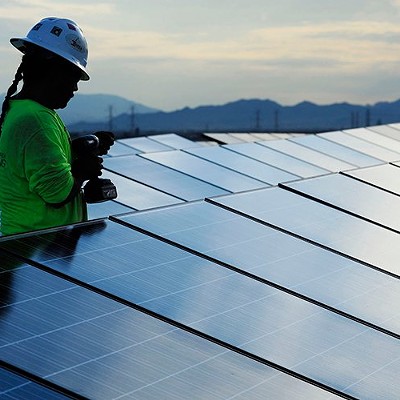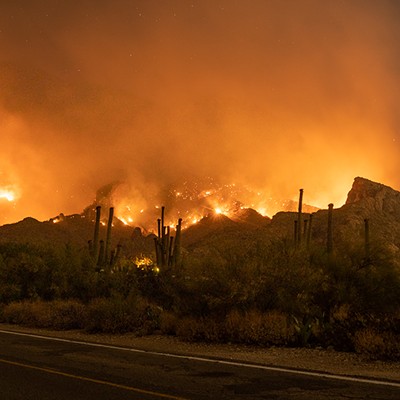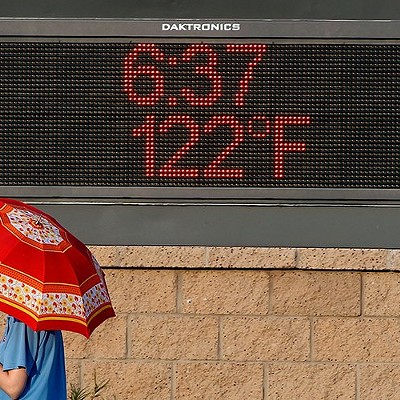Last month, Tucson's hottest June on record, President Obama revealed his Climate Action Plan, to cut carbon pollution, accelerate clean energy and prepare for climate change that's already here.
The president is doing what he can on this issue. With a receptive Congress, he could do more. But that's not likely to happen anytime soon.
The fact is, we can't afford to wait. And, we can't afford to sit back and let others try to solve this problem for us. We all have a role to play, and that includes city government.
Shortly after I took office, Tucson adopted our own climate plan, with steps we can take to reduce our contribution to climate change, and prepare for the future.
Preparing for climate change
Higher temperatures will mean more stress on people and infrastructure. One solution is very low-tech: shade. This fall, I'll be announcing a drive to plant 10,000 trees in Tucson — native and low-water-use — working with local nonprofits Trees for Tucson, Watershed Management Group and others.
As we increase our shade canopy, we decrease our heat island effect, keeping our days, and especially our nights, a bit cooler.
Because trees need water, this spring, the city adopted Green Streets guidelines. In the future, as public roads are built or rebuilt, they'll include features to retain and use runoff to irrigate trees and other plants in roadside landscaping. Again, this is a low-tech solution, but an effective one. And it's one Tucsonans can use in their own yards, by planting trees in basins and using gravity to direct rainwater to roots.
Cutting emissions
For decades now, the city has worked to cut energy waste. As early as the 1990s, Tucson adopted a Sustainable Energy Standard for new city buildings. In 2006, we adopted LEED Silver standards for new city-owned buildings and renovations over 5,000 square feet. These standards helped create and support a local green building industry, as more builders and developers gained expertise with these materials and methods.
The city is replacing our fleet of Environmental Services collection trucks, moving from diesel to compressed natural gas (CNG). Not only is CNG cheaper than diesel, converting to CNG will reduce fleet carbon emissions by 20 percent. And Tucson's leadership will help expand the fueling infrastructure for other commercial fleets to switch to CNG.
Last year, Tucson was awarded an IBM Smarter Cities Challenge Grant to help Tucson Water operate more efficiently. Now, they're working on a plan to implement recommendations from the IBM consulting team. Pumping and treating water uses energy, so saving water saves energy, too.
Through PAG, we continue to fund bike and pedestrian improvements. Also, the city is making policy changes to encourage transit-oriented development, reducing automobile use and carbon pollution through increased use of transit, bicycles and walking.
We dramatically increased our recycling capacity. Now, city blue barrels can accept almost all plastics. If we recycled enough to keep our facility running at full capacity, it would have the effect of taking about 45,500 cars off the road. Recycling is easy to do and it really is important.
Boosting solar
In 2007, Tucson was selected by the U.S. Dept. of Energy as one of the nation's first Solar America Cities.
Today, the city maintains solar panels at 16 sites, and we've partnered with TEP to install another 3.758 Megawatts of solar at Tucson Water's recharge facility in Avra Valley — a large-scale solar farm.
Unfortunately, the Arizona Corporation Commission gutted solar incentives last year, slowing the pace of solar for residential and commercial properties statewide. This was the wrong decision and I am hopeful that the ACC, or a future ACC, will reconsider and reinstate those incentives.
Cities have limited power to impose change, particularly where state government is unsupportive and likely to intervene. Even so, Tucson is taking positive steps.
Climate change is a global problem. Nonetheless, it's important to do what we can, as a city and in our own lives and choices as consumers. No one can do everything. But that's no excuse to do nothing. Too much is at stake.










